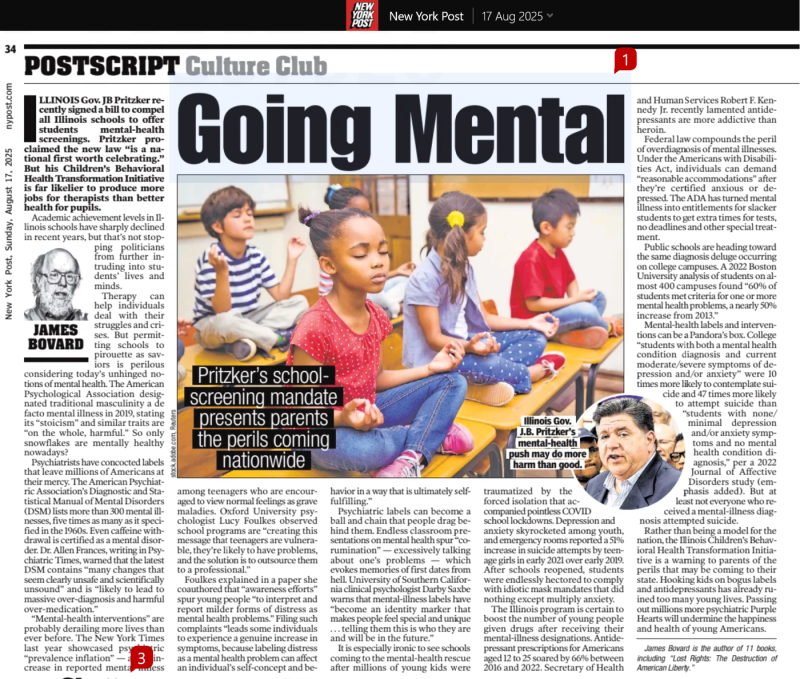JB Pritzker’s school-screening law mandates more mental illness — and your state could be next, parents
Illinois Gov. JB Pritzker recently signed a bill to compel all Illinois schools to offer students mental-health screenings. Pritzker proclaimed the new law “is a national first worth celebrating.”
But his Children’s Behavioral Health Transformation Initiative is far likelier to produce more jobs for therapists than better health for pupils.
Academic achievement levels in Illinois schools have sharply declined in recent years, but that’s not stopping politicians from further intruding into students’ lives and minds.
Therapy can help individuals deal with their struggles and crises. But permitting schools to pirouette as saviors is perilous considering today’s unhinged notions of mental health.
The American Psychological Association designated traditional masculinity a de facto mental illness in 2019, stating its “stoicism” and similar traits are “on the whole, harmful.” So only snowflakes are mentally healthy nowadays?
Psychiatrists have concocted labels that leave millions of Americans at their mercy.
The American Psychiatric Association’s Diagnostic and Statistical Manual of Mental Disorders (DSM) lists more than 300 mental illnesses, five times as many as it specified in the 1960s. Even caffeine withdrawal is certified as a mental disorder.
Dr. Allen Frances, writing in Psychiatric Times, warned that the latest DSM contains “many changes that seem clearly unsafe and scientifically unsound” and is “likely to lead to massive over-diagnosis and harmful over-medication.”
“Mental-health interventions” are probably derailing more lives than ever before. The New York Times last year showcased psychiatric “prevalence inflation” — a vast increase in reported mental illness among teenagers who are encouraged to view normal feelings as grave maladies.
Oxford University psychologist Lucy Foulkes observed school programs are “creating this message that teenagers are vulnerable, they’re likely to have problems, and the solution is to outsource them to a professional.”
Foulkes explained in a paper she coauthored that “awareness efforts” spur young people “to interpret and report milder forms of distress as mental health problems.”
Filing such complaints “leads some individuals to experience a genuine increase in symptoms, because labeling distress as a mental health problem can affect an individual’s self-concept and behavior in a way that is ultimately self-fulfilling.”
Psychiatric labels can become a ball and chain that people drag behind them. Endless classroom presentations on mental health spur “co-rumination” — excessively talking about one’s problems — which evokes memories of first dates from hell.
University of Southern California clinical psychologist Darby Saxbe warns that mental-illness labels have “become an identity marker that makes people feel special and unique . . . telling them this is who they are and will be in the future.”
It is especially ironic to see schools coming to the mental-health rescue after millions of young kids were traumatized by the forced isolation that accompanied pointless COVID school lockdowns.
Depression and anxiety skyrocketed among youth, and emergency rooms reported a 51% increase in suicide attempts by teenage girls in early 2021 over early 2019. After schools reopened, students were endlessly hectored to comply with idiotic mask mandates that did nothing except multiply anxiety.
The Illinois program is certain to boost the number of young people given drugs after receiving their mental-illness designations.
Antidepressant prescriptions for Americans aged 12 to 25 soared by 66% between 2016 and 2022. Secretary of Health and Human Services Robert F. Kennedy Jr. recently lamented antidepressants are more addictive than heroin.
Federal law compounds the peril of overdiagnosis of mental illnesses. Under the Americans with Disabilities Act, individuals can demand “reasonable accommodations” after they’re certified anxious or depressed.
The ADA has turned mental illness into entitlements for slacker students to get extra times for tests, no deadlines and other special treatment.
Public schools are heading towards the same diagnosis deluge occurring on college campuses. A 2022 Boston University analysis of students on almost 400 campuses found “60% of students met criteria for one or more mental health problems, a nearly 50% increase from 2013.”
Mental-health labels and interventions can be a Pandora’s box. College “students with both a mental health condition diagnosis and current moderate/severe symptoms of depression and/or anxiety” were 10 times more likely to contemplate suicide and 47 times more likely to attempt suicide than “students with none/minimal depression and/or anxiety symptoms and no mental health condition diagnosis,” per a 2022 Journal of Affective Disorders study (emphasis added). But at least not everyone who received a mental-illness diagnosis attempted suicide.
Rather than being a model for the nation, the Illinois Children’s Behavioral Health Transformation Initiative is a warning to parents of the perils that may be coming to their state.
Hooking kids on bogus labels and antidepressants has already ruined too many young lives. Passing out millions more psychiatric Purple Hearts will undermine the happiness and health of young Americans.
James Bovard is the author of 11 books, including “Lost Rights: The Destruction of American Liberty.”



Comments are closed.